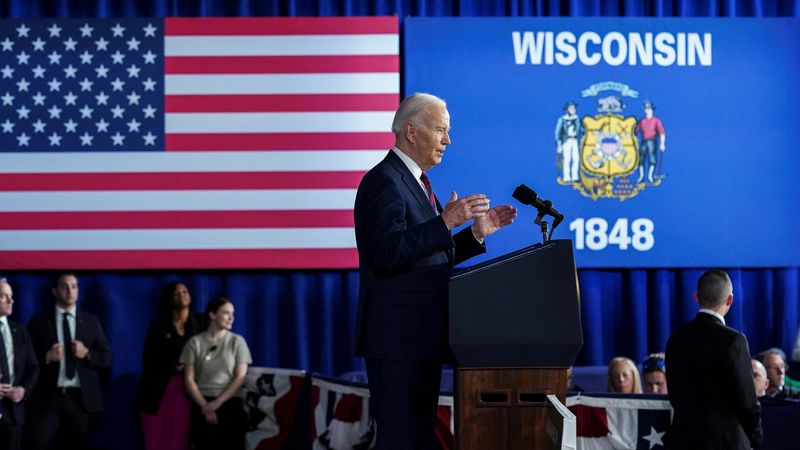WASHINGTON (Reuters) – Opposition to President Joe Biden‘s strong support of Israel’s war against Hamas faces a fresh test on Tuesday in Wisconsin where pop-up groups on a shoestring budget are urging voters to mark themselves uncommitted in the state’s Democratic primary.
For two weeks, 60 grassroots groups and organizers have advanced their cause with phone banks, mailers, banners, knocks on doors and “friend banks” where volunteers contact friends who then contact their friends.
Their goal is to get 20,682 voters to mark their ballots “uninstructed,” Wisconsin’s version of “uncommitted.” The number is significant. Biden, a Democrat, beat Republican Donald Trump by that number in the state in the 2020 presidential election.
It remains unclear whether these uncommitted voters will abandon Biden and cost him the White House.
But the Wisconsin efforts, buoyed by similar campaigns in primaries in Hawaii, Michigan and Minnesota, could have consequences. Opinion polls show Biden and Trump running neck-and-neck nationally ahead of their Nov. 5 election rematch and Biden’s 2020 victory was due to narrow wins in key states.
“We’re watching the precincts in Madison and Milwaukee the closest and there is a flurry of activity in those areas,” said Halah Ahmad, a spokeswoman for the “uninstructed” campaign in Wisconsin, a state with an open primary where voters need not register a party to vote.
Some Democrats have voiced surprise at opposition to Biden’s strong support for Israel’s assault on Hamas-ruled Gaza, where health officials say more than 32,000 Palestinians have been killed following an Oct. 7 Hamas cross-border attack in which Israel says 1,200 people were killed and 253 taken hostage.
As famine looms in Gaza and amid pressure for a truce at home and abroad, the U.S. abstained last week on a U.N. Security Council resolution demanding an immediate ceasefire, sparking a spat with Israel, its close Middle East ally.
Biden campaign spokeswoman Lauren Hitt said the president “shares the goal for an end to the violence and a just, lasting peace in the Middle East. He’s working tirelessly to that end.”
Organizers demand that Biden call for a permanent ceasefire and stop military aid to Israel as they plan for the Democratic National Convention in Chicago in August, where Biden is expected to be nominated.
“The White House has changed its rhetoric on the war to where it should have been since the start, but they are still failing to demonstrate a meaningful policy shift when it comes to weapons and funding,” said Abbas Alawieh, a top official for the national uncommitted campaign.
More than 4,500 delegates will gather in Chicago to formally nominate Biden. So far, uncommitted movements have won 25 delegates in five states, but Alawieh said he sees the meeting as an “important inflection point for the movement.”
Wisconsin and Michigan are part of an imaginary “blue wall” that Biden will need to hold to secure a second term, a drive complicated by the popularity of third party candidates like Robert F. Kennedy Jr.
In 2016, Trump flipped both battleground states as he defeated Hillary Clinton and won the White House; Biden took them back from Trump in 2020.
The president visited Wisconsin in March and said there is an “awful lot at stake” and his campaign will “get down to knocking on doors” in Wisconsin and several other states.
Conventional wisdom among Democrats is that inflation remains the bigger concern for voters in U.S. Midwestern states like Michigan, Minnesota and Wisconsin and the impact from the uncommitted movement there will be minimal in November.
Adrian Hemond, a political analyst and chief executive of the consulting firm Grassroots Midwest, who previously worked for Democrats in Michigan, said the uncommitted movement needs 20 to 25% in swing state primaries.
“So far that hasn’t been the case,” he said.
SHOESTRING BUDGETS, PHONE CALLS
In Michigan, “uncommitted” won about 13% of the state’s Democratic primary vote. In Minnesota, it won over 19% of the state’s primary vote after an eight-day campaign with a budget of less than $20,000. Wisconsin campaigners are operating on a similar shoestring budget and with little time to waste.
“We made over 200,000 calls in four days before the primary,” said Asma Nizami, an organizer with Vote Uncommitted Minnesota, who is a part of the national uncommitted group. Wisconsin’s Ahmad said the state is using the same dialer system to reach 15,000 to 20,000 voters a day.
“It’s almost unheard-of for political campaigns to be up and running as fast,” Alawieh said. “But this movement is grounded in historic levels of anti-war organizing since October.”
(Reporting by Nandita Bose in Washington; Additional reporting by Bianca Flowers in Chicago; Editing by Heather Timmons and Howard Goller)
